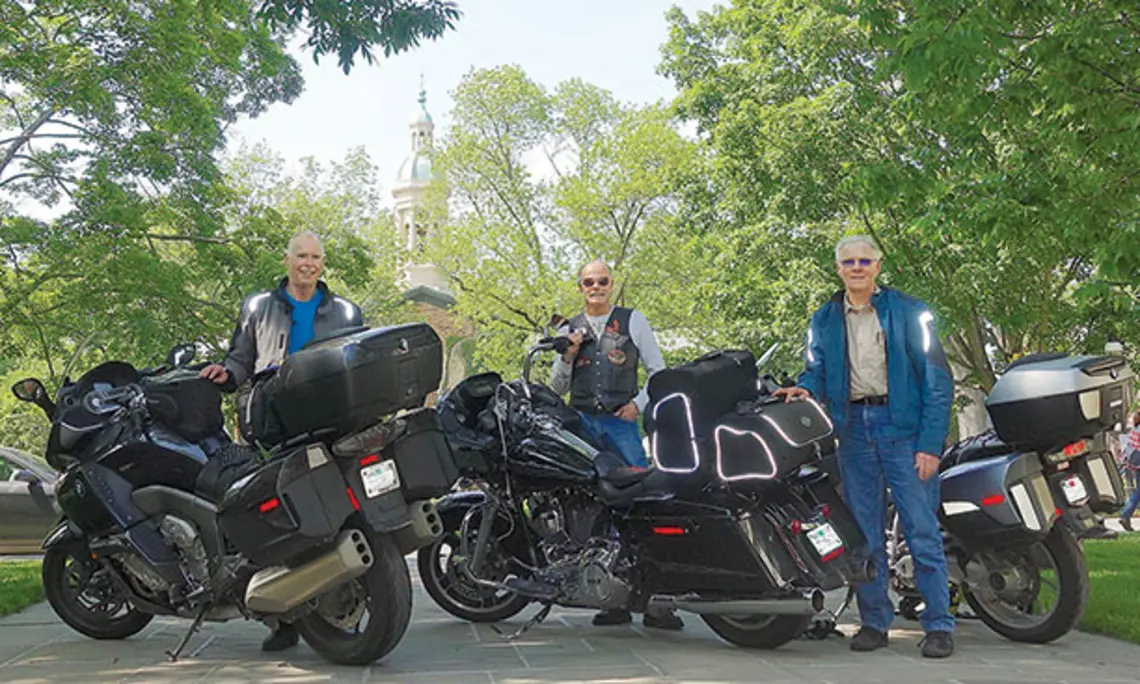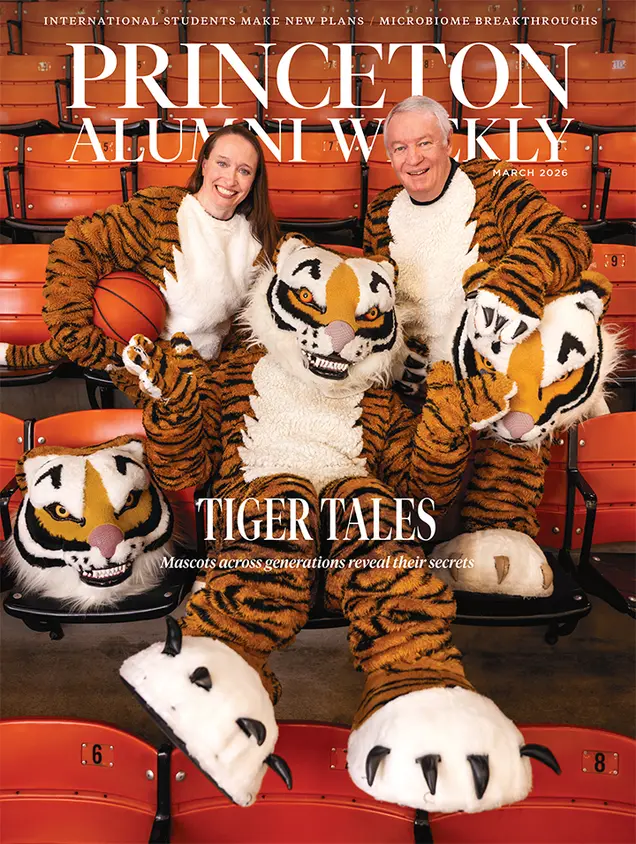
Travels with Harley: Geoff Smith ’71, John Drummond ’71, and Brad O’Brien ’71
PAW Tracks
For ’71 classmates Geoff Smith, John Drummond, and Brad O’Brien, riding to Reunions by motorcycle last year was a chance to see small-town America and reflect on their college years.
PAW Tracks is also available on iTunes — click here to subscribe
TRANSCRIPT
Brett Tomlinson: In 2011, Geoff Smith made a cross-country motorcycle trip to Princeton to join his classmates for their 40th reunion. Under the tents that weekend, everyone wanted to hear about his trip, and in the years that followed, two fellow Californians, John Drummond and Brad O’Brien, started angling for spots on the next big adventure.
Geoff Smith: And I thought they were both just kind of all talk — yeah, yeah, sure. And then we got up to the time and they were both really excited about going.
BT: Two weeks, three motorcycles, and 4,600 miles of open road, mostly open at least. That was the journey back to Reunions last May for Smith, Drummond, and O’Brien. It was a chance to see America up close, and reminisce about Princeton along the way. At the end of their journey, the three classmates sat down with PAW.
O’Brien, a California native, recalled not knowing what to expect from Princeton.\
Brad O’Brien: I applied to Princeton and accepted sight unseen. So I had not been here before. So when I arrived and realized it was a single-sex institution, I thought, “I didn’t think this one all the way through.” But actually it turned out to be — I got quite lucky because I met my wife at Princeton and we’re celebrating our 45th wedding anniversary this month. So that worked out.
The intellectual simulation was a big deal for me. I was in the Woodrow Wilson School, which gave you a chance to take courses from four different departments, and work collegially with some very talented classmates.
BT: Drummond and Smith also enjoyed the intellectual qualities of everyday life on campus.
John Drummond: Every private university in the country costs about the same number of dollars, but here what you get, for the same number of dollars, is the richest peer group you can imagine. So quite apart from the professors being stimulating, that guy in the chair beside you had something to say, and I was impressed. I had never been exposed to a uniformly high-intellectual standard crowd like that before.
GS: One of the things that stimulated me a lot was the intellectual banter that went on outside of class. If you were just walking to dinner or sitting in a living room on some poor furniture, just the discussion level always required you to be on your toes and I really enjoyed that a lot and it changed me a lot in terms of the conversations that I have with people.
BT: At Princeton in the late ’60s and early ’70s, political activism was growing, largely because of the Vietnam War and the draft. Here again is John Drummond.
JD: Well, I was from Canada I knew very little about the sociological disturbances the going on around the war. And I actually have to say right now that one of my truly memorable experiences at Princeton is the night of the first lottery. I was a bystander because I was a Canadian. It was a night when, for the people who are not familiar with this, this is when they drew all the birthdates out of a tumbler and the people with the first birthdates drawn were going to be drafted almost inevitably and those with later birthdates were unlikely to be drafted. It was a night at Princeton that started as quiet as any night there ever was at Princeton, and ended as noisy as any night there ever was because people were either, you know, had two reasons: to celebrate or be miserable about what had just happened to them in the draft. And I watched the demonstrations of the SDS, and this was eye-opening for somebody who had not lived in the United States before. So it was really a sociologic, political eye-opener for me as somebody from outside this country, watching all of this.
BT: Memories of Princeton were part of the nightly discussions for Drummond, O’Brien, and Smith. But the trip itself was the central topic. From their meet-up point in Barstow, Calif., they drove—
GS: Through Las Vegas, went up through Zion National Park, which is in southern Utah…
After that we passed through Capitol Reef National Monument, which is in the middle of nowhere…
Then down through the Colorado River, one of our pictures was taken on a cliff, 800 feet above the Colorado River…
Then moved into Colorado, through Cortez…
We rode the Million Dollar Highway, between Durango and Ouray…
Crossed the Continental Divide…
Then down, nipped off the corner of New Mexico, went down into Texas…
Then into Louisiana…
We rode the Natchez Trace Parkway, which is the most mellow road in the United States…
Then there’s the Tail of the Dragon, which is a rite of passage for East Coast motocyclists…
Caught some rain coming out of there, crossing the Great Smokies…
Then we rode up to classmate Kirk Liddell’s horse farm, near Lancaster, Pa.—
BT: For the three Californians, the trip offered different views of the country each day.
BO: We went through Las Vegas but didn’t stop, we just went through it. We went through Norfolk, Va., which is a smallish city, through the urban area. But other than that, we were in rural areas the whole time. So the towns we’re going through are small. And so we’d roll up to some place, and people would see our California license plates, and they’d say, “Are you guys from California?” Yeah! Where’ya going? We’re going to New Jersey. Half the conversations would stop right there. That’s all they needed to know. You’re doing a big trip, tell me about your trip, tell me about California. And then every once in a while somebody would say, “Why are you going to New Jersey?” And then we would say we’re going to our college reunion. And it would stop, the questions would stop. That’s all they needed to know. So we were in a part of the world where the Ivy League, Princeton, it’s — they know it exists, if you said the name they’d probably know what you were talking about, but they didn’t care. It didn’t matter.
GS: Only five percent of our route was on interstates. It was all two-lane roads through small towns, you’d be slowing from 55 or whatever down to 35, wandering through these towns, and you really get a feel for what small town America is in different parts of the country. A lot of it isn’t doing real well, some of it is. And you’d see boarded up buildings in the middle of little towns and then you’d see perfectly neat, well-mown lawns next to well-painted little houses out there. It was — seeing small-town America and seeing how beautiful it is in so many different parts of the country, from the dry parts to the forested parts, that was a real high point.
JD: There weren’t many low moments, but one of the low moments was when, I guess as we were coming out of Pennsylvania, I saw a sign that said take this turn to New York and New Jersey, and it was wonderful to ride into Princeton, but knowing that this ride was almost over — do you recall that sign?
BO: Yeah, very sad, seeing your first New Jersey license plates.
JD: It was really one of the only bad moments there was.
BO: Realizing you’re getting close to the end of the ride, it’s sad. Because we were having such a good time. It was totally epic.
BT: Our thanks to Geoff Smith, Brad O’Brien, and John Drummond for sharing their stories with PAW. Brett Tomlinson produced this episode. The music is licensed from FirstCom Music.
No matter how you plan to get back to Reunions, if you have a story that you’d like to share with PAW, we want to hear from you. We’ll be recording interviews for the next season of PAW Tracks at Reunions this June. If you’d like to participate, click the Share Your Story link at PAW Online or send us an email at paw@princeton.edu.
Paw in print

March 2026
Mascots across generations; biome breakthroughs; international students make new plans.


No responses yet